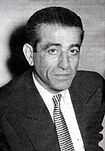Syrian people
| |||||||||||||||||
| Total population | |||||||||||||||||
|---|---|---|---|---|---|---|---|---|---|---|---|---|---|---|---|---|---|
| Syria: 22,457,336 (July 2013 est.)[1] | |||||||||||||||||
| Regions with significant populations | |||||||||||||||||
| 3 million[2] | |||||||||||||||||
| 153,392[3] | |||||||||||||||||
| 40,840[4] | |||||||||||||||||
| Languages | |||||||||||||||||
| Arabic (Syrian Arabic, North Syrian Arabic), Aramaic (Western Neo-Aramaic, Assyrian Neo-Aramaic, Surayt), Kurdish, South Azeri and Armenian | |||||||||||||||||
| Religion | |||||||||||||||||
|
Islam, mostly Sunni, and a minority of Shi'as and Alawites Christianity, mostly Greek Orthodox, Greek Catholic and a minority of Syrian Orthodox Druze Yazidis Judaism | |||||||||||||||||
| Related ethnic groups | |||||||||||||||||
|
Other Levantines Arabs, Syriacs/Arameans and other Semites | |||||||||||||||||
The Syrian people (Arabic: الشعب السوري / ALA-LC: al-sha‘ab al-Sūrī) are the inhabitants and citizens of the Syrian Arab Republic. Most modern-day Syrians are commonly described as Arabs due to some Arab ancestry, language, and bonds to Arab culture and history. However, there are Kurds, Turkmens, Circassians, Syriacs/Assyrians and other minorities, who also reside in Syria and express the Syrian National identity. Many Syrians live outside of Syria, and they stay connected to their cultural roots by visiting their homeland, forming and participating in Arab and Syrian communities in their new countries, listening to Syrian music, watching Syrian Television, and preparing Syrian cuisine.
Damascus, the capital of Syria, is one of the longest continuously inhabited cities[5][6] in the world.
Etymology
Syria is the name that was given to the region by the Greeks and Romans and probably derives from the Babylonian suri. Arabs traditionally referred to Syria and a large, vaguely defined surrounding area as Sham, which translates as "the northern region," "the north," "Syria," or "Damascus." Arabs continue to refer to the area as Sham up until today. That name still is used to refer to the entire area of Jordan, Syria, Lebanon, Israel, and the West Bank and has become a symbol of Arab unity. However, the national and ethnic designation "Syrian" is one that has been used, accepted, and espoused by the Syrian people since the advent of modern day nationalism, which emanated from Europe and began in earnest with the culmination of the Napoleonic Wars of the early 1800s.
Language
Arabic is the mother tongue of some 90%[1] of Syrians as well as the official state language. The Syrian dialect, which belongs to the same Eastern Mediterranean-Levantine family tree of dialects, varies little from Modern Standard Arabic. The standardized form of Arabic, used in formal settings throughout the Arab world, contains the same vocabulary and grammar for all Arab countries. Kurdish, Armenian, Turkish, and Circassian are also spoken in Syria by their respective minority communities. A direct descendant of the Aramaic of Jesus Christ, is still spoken in ancient Christian village of Ma'loula by Muslim and Christian Arameans residents. Aramaic is further widely understood by Syrian-Christian communities — all of whom use Syriac as a liturgical language. English, and to a lesser extent French, is widely understood and used in interactions with tourists and other foreigners.
Religion
Religious differences in Syria have historically been tolerated,[citation needed] and religious minorities tend to retain distinct cultural, and religious identities. Sunni Islam is the religion of 74% of Syrians. The Alawites, an ancient off-shoot of Shia Islam that is distinct from Sunni Islam, make up 12% of the population and mostly live in and around Latakia. Christians make up 10% of the country. Most Syrian Christians adhere to the Byzantine liturgical rites, the two largest are the Greek Orthodox and the Greek Catholic churches.[7][8] The Druze, are a mountainous people who reside in Jebel Druze. The Druze, who helped spark the Great Syrian Revolt, are known as fierce soldiers. The Ismailis are an even smaller sect, that originated in Asia. Many Armenian Christians fled Turkey during the Armenian Genocide and settled in Syria. The Kurds, although Sunni Muslim, are very secular and have a distinct language. The Circassians, are of North Caucasus origin and are mostly Sunni Muslim, following the Hanafi school of thought. The Circassians number about 100,000 and mostly live in northern Syria. The nomadic Beduoin lead a lifestyle that keeps them largely separated from the rest of society, herding sheep and moving through the desert, although some have settled in towns and villages. There are roughly 500,000 Palestinian refugees, who were expelled from their homeland in 1948 after the creation of Israel. The community of Syrian Jews inside Syria once numbered 30,000 in 1947 but has only 200 today.[9]
Beliefs
The Syrian people's beliefs and outlooks, similar to those of most Arabs and people of the wider Middle-East, are a mosaic of West and East. Conservative and liberally minded people will live right next to each other, and hold debates with each other. Like the other countries in the region, religion permeates life; the government registers every Syrian's religious affiliation.
Cuisine
Syrian cuisine is dominated by ingredients native to the region. Olive oil, garlic, olives, peppermint, and sesame oil are some of the ingredients that are used in many traditional meals. Traditional Syrian dishes enjoyed by Syrians include, tabouleh, labaneh, shanklish, wara enab, makdous, kebab, sfiha, moutabal, hummus, manaeesh, bameh, and fatoush. Before the main courses, Syrians eat maza, which is basically an appetizer. Maza is usually served with Arab-style tea - highly concentrated black tea, which is highly sweetened and served in small glass cups. Another popular drink, especially with Christian and non-practicing Muslim men, is the Arabian Liquor Arak, which is produced from grapes or dates and flavored with aniseed, and can have an alcohol content of over 90% ABV (however, most commercial Syrian Arak brands are about 40-60% ABV).
Famous people with Syrian ancestry
- Paula Abdul, is a singer and successful as an original judge on American Idol in the 2000s.
- Rosemary Barkett (born 1939), was the first woman to serve on the Florida Supreme Court, and the first woman Chief Justice of that court. She currently serves as a federal judge on the United States Court of Appeals for the Eleventh Circuit.
- Hala Gorani (born March 1, 1970), is a news anchor and correspondent for CNN International.[10]
- Teri Hatcher, is an actress most famous for her roles in Desperate Housewives and Lois & Clark: The New Adventures of Superman. Her mother is part Syrian.
- Steve Jobs (February 24, 1955 – October 5, 2011), was the co-founder and former CEO of Apple, the largest Disney shareholder,[11] and a member of Disney's Board of Directors. Jobs was considered a leading figure in both the computer and entertainment industries.[12]
- Bob Marley was of part Syrian descent[13]
- Carlos Menem (born July 2, 1930), former president of Argentina (1989-1999)
- Jerry Seinfield is of maternal Syrian Jewish descent.
See also
- Ottoman Syria
- Arabs
- Arameans
- Armenians
- Kurds
- Syriacs
References
- ↑ 1.0 1.1 "The World Factbook". Cia.gov. Retrieved 2013-12-29.
- ↑ Syrians in Brazil
- ↑ "Table B04006, People Reporting Ancestry, 2011 American Community Survey 1-Year Estimates, United States Census Bureau". Factfinder2.census.gov. 2010-10-05. Retrieved 2014-01-22.
- ↑ [http://www12.statcan.gc.ca/.../dp-pd/dt-td/Rp-eng.cfm... "Ethnic Origin (264), Single and Multiple Ethnic Origin Responses (3), Generation Status (4), Age Groups (10) and Sex (3) for the Population in Private Households of Canada, Provinces, Territories, Census Metropolitan Areas and Census Agglomerations, 2011 National Household Survey"].
- ↑ "Restoration of Damascus". Saudi Aramco World. Retrieved 2013-12-29.
- ↑ http://bostonglobe.longjaunt.com/photos/2008/05/28/damascus/
- ↑ "Syria". State.gov. Retrieved 2013-12-29.
- ↑ "Guide: Syria's diverse minorities". BBC News. 2011-12-09.
- ↑ Derhally, Massoud A. (7 February 2011). "Jews in Damascus Restore Synagogues as Syria Tries to Foster Secular Image". Bloomberg. Retrieved 8 May 2011. "The project, which began in December, will be completed this month as part of a plan to restore 10 synagogues with the backing of Syrian President Bashar al-Assad and funding from Syrian Jews."
- ↑ Abbas, Faisal (2006-01-17). "Q&A with CNN’s Hala Gorani". Asharq Al-Awsat. Retrieved 2006-05-20.
- ↑ "Steve Jobs' Magic Kingdom". BusinessWeek. 2006-01-06. Retrieved 2006-09-20.
- ↑ Burrows, Peter (2004-11-04). "Steve Jobs: He Thinks Different". BusinessWeek. Retrieved 2006-09-20.
- ↑ Ziggy Marley to adopt Judaism?, Observer Reporter, Thursday, April 13, 2006, Jamaica Observer
External links
| Wikimedia Commons has media related to People of Syria. |
- Syrian people, Every Culture
- Photos and images of Syrian people, Syrian History - Online
- Collections of images of Eastern Mediterranean people, including Syrian people, Mideast Image
- [http://www.britannica.com/EBchecked/topic/150420/Damascus/276647/People, Syrian people, Encyclopedia Britannica]
| |||||||
| ||||||||||||||||||||||||||||||||||||||||||||||||||














